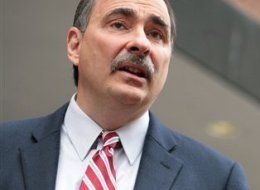David Axelrod: Republican Congress Could Be 'More Extreme' Than Bush (EXCLUSIVE)

With polls and prognosticators predicting a massive Republican rout -- and the likely election of uncompromising, out-of-the-mainstream conservatives -- in the fall, the Obama administration has begun raising dire alarms in its pitch to voters.
Remember the Bush administration, the argument goes. It could be worse.
"I saw that Joe Miller said that he would abolish Social Security if he had the chance and he is not alone," said chief adviser David Axelrod.
"This is akin to what (Nevada GOP Senate candidate) Sharron Angle has said in Nevada and also a number of these other Republicans. So, this could go one step beyond the policies of the Bush administration to something more extreme than we have seen." In an interview with the Huffington Post from his West Wing office late last week, Axelrod's criticism of the president's Republican critics were some of the most sweeping to date. The senior adviser called the
GOP strategy for scuffling Obama, "insidious" if not "clever." Republican leadership, he ventured, has "put emphasis on throttling things down... hoping that the mess that they created... would be so difficult to clean up that they could then blame us for their problems."
"I think realistically what you have is a Republican Party that is now thoroughly focused on one thing and they have been frankly from the beginning: which is to try and regain power," he said. "And their strategy is to lock everything down and not let anything happen." The remarks suggest a White House that is frustrated at the hand it's been dealt, as well as increasingly concerned about the state of the electorate. Axelrod declined to place a marker on how November will play out. But he did note that history is not on the side of the president he serves.
By Monday, that history's repetition was crystallizing. Stu Rothenberg, editor of the Rothenberg Political Report, released new predictions, putting the number of Republican gains in the House at 37 to 42 seats. Forty-five to 55 seats, he added, are "quite possible." A poll released by ABC News and the Washington Post the night before, meanwhile, revealed that for the first time in more the four years, the GOP is running even with Democrats in terms of the confidence it earns from registered voters. Faced with the possibility of a major, historic sweep on Election Day, however, the Democratic base isn't showing signs of turning out in November.
"In a sense, we are a victim of our own success, of the expectations that the president aroused, and the fact that we have gotten so much done," Axelrod said, in attempting to explain the enthusiasm gap between Republican and Democratic voters. "Everyone who has a particular passion says, 'Well if you got that done why couldn't you get this done? If you got health care done why couldn't you get energy reform done? If you got financial reform why couldn't you get something else done?' The successes we've had have been a double-edged sword. I hope that at the end of the day, however, people will realize that this has been a period of enormous progress. I'm not begrudging people's desire to get more done. There is a lot of pent-up energy and aspirations and all these things are important. But
objectively this has been an enormously productive time and everyone who helped elect the president should feel gratified at what's been accomplished because it wouldn't have happened but for their efforts."The problem facing the White House is that there is little they can do at this point to significantly affect the type of economic or political changes that would appeal to voters of any or all stripes. The president, over Labor Day weekend, laid out a set of fairly robust proposals to spur business growth, including extending tax breaks for research and development as well as money for infrastructure projects. Axelrod, likewise, pledged to have a vote the first day that Congress is back in session on a $30 billion small business tax cut bill that Republicans had stalled in the Senate. But even those measures don't seem likely to change the trajectory of public opinion or electoral politics.
"The depth of the problem that was created, the irresponsible policies, is something we are going to live with for a long time," Axelrod acknowledged. "People are struggling and you want a silver bullet that will make that all better but there is no silver bullet."
And herein lies, perhaps, the point that causes the most introspection among the Obama communications team -- how could they allow so many of those voters looking for a silver bullet to believe that the party that caused the strife in the first place is the one to fix it? An NBC/WSJ Poll released on Monday, for instance, showed that 58 percent of the public thinks Republicans would have different policies than President Bush's.
"Perhaps this is where we have been failing to communicate," said Axelrod. "(A) large number of people don't believe that a Republican Congress would go back to the policies of George W. Bush, even though their own leaders have said as much in public. Pete Sessions said we want to go back to the same exact agenda that was there before this president took office. So our job in the next eight weeks is to make sure that people understand that, that they understand the stakes."http://www.huffingtonpost.com/2010/09/07/exclusive-david-axelrod-r_n_707211.html